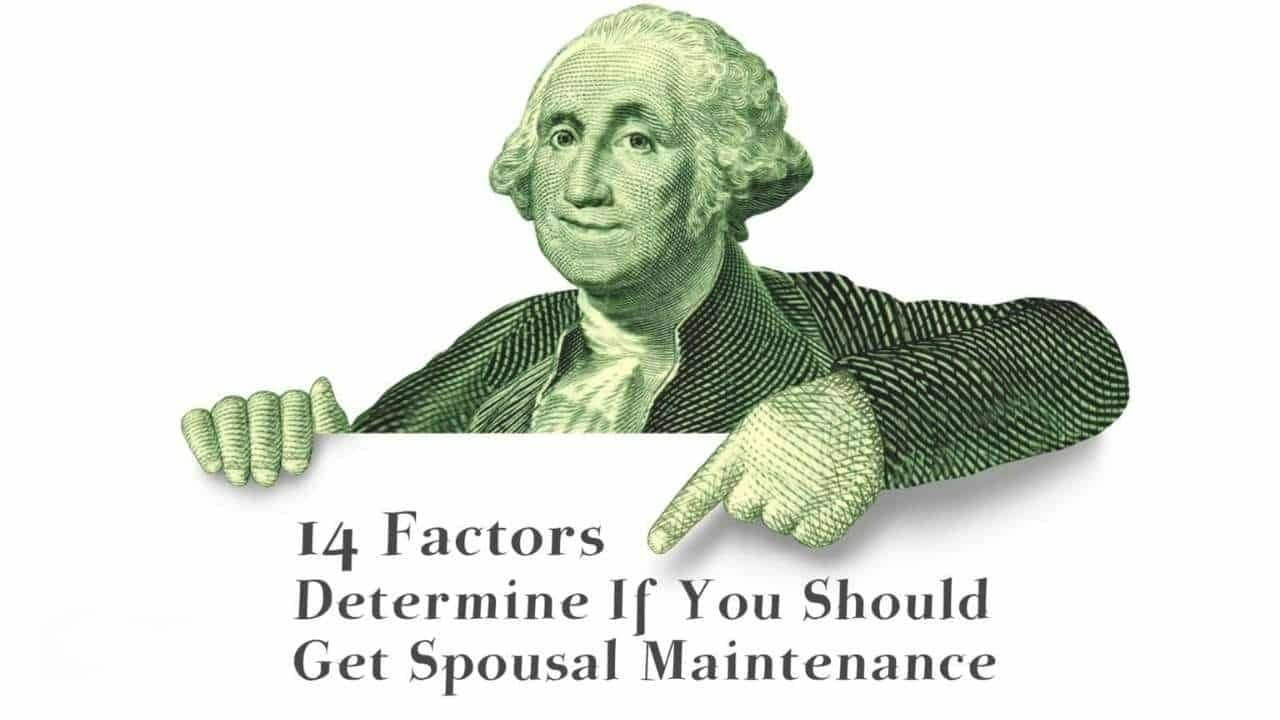Most people are very concerned about the amount of a spousal maintenance award or about how long the support obligation will last. However, the first question that must be asked is whether an award for maintenance is even appropriate.
Decisions about spousal support in Illinois are controlled by Section 504 of the Illinois Marriage and Dissolution of Marriage Act (750 ILCS 5/504), “the court shall first determine whether a maintenance award is appropriate.” This law provides specific factors that must be considered when making a determination if spousal maintenance is appropriate in any divorce case.
The Illinois Spousal Maintenance Factors
The following are the fourteen (14) factors an Illinois judge will consider when assessing the appropriateness of a spousal maintenance award in any divorce case:
1. Income and Property Of Each Party
This factor looks at income and property from all angles. In general, what marital and non-marital property is awarded to each party? What financial obligations are associated with property awarded to the parties? It is possible that an award of property could eliminate or reduce an otherwise award for maintenance.
2. The Needs Of Each Party
There are three (3) key issues to look at under this factor. What are the recipient spouse’s needs? What is the recipient spouse’s ability to meet those needs? Does the payor spouse have the capacity to supplement the difference between the recipient spouse’s needs and the ability to meet those needs? Remember that needs must be legitimate and not mere luxuries. In Re Marriage of Homann, 276 Ill. App. 3d 236.
3. Realistic Present and Future Earning Capacity of Each Party
The Court is looking at the parties’ incomes at the time of the divorce, but they are also looking at what their potential income could be in the future. A substantial disparity in the parties’ earning capacity could be a big factor in the Court’s reasoning for awarding maintenance. Remember, however, that the spouse requesting maintenance has an obligation to seek and accept appropriate employment. In re Marriage of Schuster, 224 Ill. App. 3d 958.
4. Impairment of Seeking Party’s Present/Future Earning Capacity
The earning capacity factor comes into play when the party requesting maintenance devoted time to domestic duties during the marriage. Perhaps that spouse did not obtain an education or training and they put off potential career opportunities due to the marriage and the various responsibilities associated with same. This factor often comes into play when one spouse stayed at home to care for the children during the marriage. That party may not have any professional experience that is recent or any at all depending on the length of the marriage. Remember that we are talking about the realistic earning capacity here and in the next factor below.
5. Impairment of the Other Party’s Present and Future Earning Capacity
A party may think that they have a “slam-dunk” case for spousal maintenance because of “X, Y, and Z”, but what if the possible payor spouse has an impairment to their earning capacity? Maybe that spouse also lost opportunities to earn income due to the marriage.
6. Can the Party Seeking Maintenance Become Self-Supporting?
Here the Court is looking at two issues:
- Can the party seeking maintenance become self-supporting, and if so,
- How long will it take for the party seeking maintenance to acquire the appropriate education, training, and employment, for them to become self-supporting?
If there are minor children involved, then the Court will also be looking at any parental responsibility arrangements and their effect on the party seeking employment.
7. Standard of Living Established During the Marriage
The standard of living experienced during the marriage can be a big factor in determining if maintenance is appropriate. This especially comes into play if it is unrealistic for the spouse seeking maintenance to earn enough alone to maintain the standard of living they were used to. Long marriages also see this factor come into play. Although the court will look at the standard of living during the marriage, that does not mean that the parties will be able to maintain that same standard of living after the divorce is finalized.
8. Duration of the Marriage
The duration of a marriage tends to be a very big factor in spousal maintenance cases. So, the longer the marriage, the longer the maintenance? Yes, usually that is the case. However, it is not unheard of for spousal maintenance to last longer when a party seeking maintenance is in failing health regardless of the length of the marriage.
9. Circumstances of the Parties
Here the Court is looking at parties’ ages, health, station, occupations, amounts, sources of income, vocational skills, employability, marital property or estate, liabilities, and their needs. As you can see, some of the factors overlap and there are so many factors to look at in every case.
10. All Sources of Public and Private Incne
Not only is the Court looking at income through employment, they are also looking at income from disability and retirement. This money can be private or public income.
11. Tax Consequences
Here the Court is looking at the tax consequences of the property division upon the respective economic circumstances of the parties. A party may have to sell assets awarded to them in order to get cash and there could then be tax consequences for selling that particular asset. Likewise, a party could be awarded an asset that is taxed or incurs a financial penalty if touched (Example: 401K).
In general, the tax consequences factor is not discussed much in case law. However, this could change after the 2019 spousal maintenance law update goes into effect after December 31, 2018. Starting January 1, 2019, spousal maintenance is no longer deductible from the payor spouse’s income for Federal income tax purposes.
12. Supporting Your Spouse and Their Career
The Court will look at a spouse’s contributions towards the payor spouse’s education, training, career, career potential, professional license, etc. Think of support and financial effort to help the payor spouse to get to where they are now. Maybe the party seeking maintenance worked full-time prior to raising the children while the other party concentrated on advancing in their career.
13. Agreement of the Parties
Maybe the parties have a valid agreement. This could be a prenuptial or post-nuptial agreement between the parties. Otherwise, the parties could decide on maintenance duration and length in a marital settlement agreement. The Court will only accept the terms of the agreement if the agreement is considered “conscionable” or fair.
14. Any Other Relevant Factor
If there is another factor that the Court believes is just and equitable to consider then they will weigh the additional factor, as well. One example would be a recipient spouse already cohabitating with a significant other.
Spousal Maintenance Factors – Key Takeaway
The Court must look at all relevant factors when determining if maintenance is appropriate. The Court is aiming to make a fair decision after weighing all relevant factors. However, the factors do not need to be given equal weight. The Court is not required to equalize the parties’ incomes after the divorce, but the Court is not barred from doing this either.
If you are wondering whether or not spousal maintenance is appropriate if you divorce, or if you think it may be time to have spousal maintenance modified due to changes in circumstances do not delay. Contact Anderson Boback & Marshall to speak to our experienced family law attorneys Chicago in about the spousal maintenance factors involved in your situation.




















